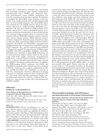 62 citations,
January 2004 in “The journal of investigative dermatology/Journal of investigative dermatology”
62 citations,
January 2004 in “The journal of investigative dermatology/Journal of investigative dermatology” A second domain of high sulfur KAP genes on chromosome 21q23 is crucial for hair structure.
September 2017 in “The journal of investigative dermatology. Symposium proceedings/The Journal of investigative dermatology symposium proceedings” CCCA can affect both genders and all ages, and it has a genetic component.
September 2017 in “PubMed” Monilethrix is a rare genetic hair disorder with no cure, but low-dose oral minoxidil may help.
 32 citations,
January 2005 in “Journal of The American Academy of Dermatology”
32 citations,
January 2005 in “Journal of The American Academy of Dermatology” Some babies are born with alopecia areata, and a treatment with clobetasol propionate can regrow hair in half of the cases.
 1 citations,
November 1990 in “International Journal of Dermatology”
1 citations,
November 1990 in “International Journal of Dermatology” Even a small melanoma can be deadly if not removed, regardless of the patient's age.
October 2021 in “QJM: An International Journal of Medicine” Oxidative stress may contribute to hair loss in Egyptian men.
210 citations,
February 2008 in “Nature genetics” Mutations in the P2RY5 gene cause autosomal recessive woolly hair.
 48 citations,
January 2012 in “The journal of investigative dermatology/Journal of investigative dermatology”
48 citations,
January 2012 in “The journal of investigative dermatology/Journal of investigative dermatology” Chemokine signaling is important for hair development.
13 citations,
January 2008 in “Springer eBooks”  August 2018 in “Current opinion in gynecology and obstetrics”
August 2018 in “Current opinion in gynecology and obstetrics” Gynecologists should learn about transgender care to provide the best service.
Early diagnosis and personalized treatment are crucial for managing pediatric androgenetic alopecia.
 43 citations,
July 1984 in “Clinical and Experimental Dermatology”
43 citations,
July 1984 in “Clinical and Experimental Dermatology” Antiandrogen therapy helped increase hair growth in women with hormonal imbalances related to baldness.
 September 2019 in “Rheumatology advances in practice”
September 2019 in “Rheumatology advances in practice” Diagnosing and treating rapidly worsening lung disease is difficult and requires better guidelines and understanding.
 5 citations,
January 2014 in “Journal of Cutaneous and Aesthetic Surgery”
5 citations,
January 2014 in “Journal of Cutaneous and Aesthetic Surgery” A woman had 13 non-cancerous cysts on her scalp successfully removed in one surgery.
 30 citations,
June 2015 in “South African journal of botany”
30 citations,
June 2015 in “South African journal of botany” Traditional healers in Namibia use 70 different plants to treat AIDS-related diseases, and more research is needed to test these plants' effectiveness against HIV.
 89 citations,
October 1996 in “Dermatologic Clinics”
89 citations,
October 1996 in “Dermatologic Clinics” Alopecia areata is likely caused by a combination of genetic factors and immune system dysfunction, and may represent different diseases with various causes.
1 citations,
November 2011 in “British journal of pharmacology” Enzymes are classified into six types and are essential for many biological processes, with only a few targeted by drugs.
31 citations,
October 1992 in “Archives of Dermatology” The man's scalp condition did not improve with tetracycline treatment.
 April 2020 in “Journal of the Endocrine Society”
April 2020 in “Journal of the Endocrine Society” A patient with untreated congenital adrenal hyperplasia had large benign tumors in her adrenal glands removed, improving her symptoms.
 8 citations,
November 2002 in “The Canadian journal of psychiatry/Canadian journal of psychiatry”
8 citations,
November 2002 in “The Canadian journal of psychiatry/Canadian journal of psychiatry” Increasing olanzapine caused hair loss in a woman, which stopped after changing medication.
 28 citations,
November 2018 in “Journal of Cellular and Molecular Medicine”
28 citations,
November 2018 in “Journal of Cellular and Molecular Medicine” CXXC5 is a protein that controls cell growth and healing processes, and changes in its activity can lead to diseases like cancer and hair loss.
 July 2017 in “Contemporary Endocrinology”
July 2017 in “Contemporary Endocrinology” The document concludes that patient outcomes for Congenital Adrenal Hyperplasia are often not ideal because of poor management and a need for better diagnosis and treatment methods.
 3 citations,
December 2021 in “Recent patents on anti-cancer drug discovery”
3 citations,
December 2021 in “Recent patents on anti-cancer drug discovery” SET7/9 enzyme affects cell growth and diseases like cancer, diabetes, and obesity.
 51 citations,
January 2012 in “Annals of Dermatology”
51 citations,
January 2012 in “Annals of Dermatology” Asian hair loss differs from Europeans; consider individual needs and psychological well-being for treatment.
 1 citations,
October 2013 in “The Journal of Dermatology”
1 citations,
October 2013 in “The Journal of Dermatology” Hair loss in a drug reaction case involved both a common shedding phase and an immune attack on hair follicle stem cells.
 July 2022 in “The journal of investigative dermatology/Journal of investigative dermatology”
July 2022 in “The journal of investigative dermatology/Journal of investigative dermatology” Tet2 and Tet3 enzymes are essential for controlling hair growth by affecting DNA demethylation and gene expression in mice.
13 citations,
February 2020 in “CHEST Journal” Vitamin C supplementation can resolve pulmonary arterial hypertension caused by vitamin C deficiency.
18 citations,
September 1979 in “DMW - Deutsche Medizinische Wochenschrift” Diane is effective for treating acne, seborrhoea, androgenic alopecia, and mild hirsutism in women.
July 2019 in “Dermatology practical & conceptual” The study found that alopecia areata is strongly linked to autoimmune diseases and may indicate a genetic predisposition to such conditions.
 2 citations,
November 2002 in “PubMed”
2 citations,
November 2002 in “PubMed” Most patients with hair loss sought treatment for cosmetic reasons, were unhappy about their appearance, and had a family history of the condition, suggesting it may be inherited.


















